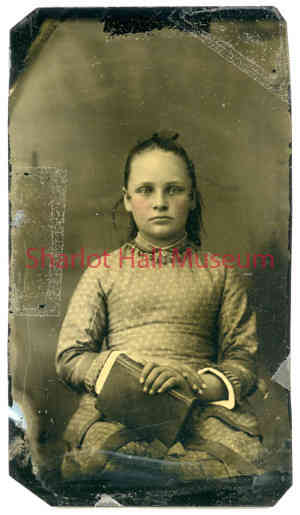Sharlot Hall - Eleven Years Old
details
Unknown Unknown po0213p.jpg MS-12, Box 19, Folder 1 Sepia 1928-0001-0001 po0213p Tintype <2x3 Photo Collections c. 1881 Reproduction requires permission. Digital images property of SHM Library & ArchivesDescription
Sharlot Madridth Hall at 11, taken at Medicine Lodge, Kansas, prior to her move to Arizona.
SHARLOT MABRIDTH HALL (b. October 27, 1870, d. April 9, 1943) moved from Lincoln County, Kansas to Arizona in 1882. She moved twelve miles southeast of Prescott, Arizona at Lynx Creek, with her father, James Knox Hall, her mother, Adeline Susannah Hall, and her brother, Edward "Ted" V. Hall.
Sharlot became a poet, a writer, a journalist, an associate editor of "Out West" magazine, and served as Arizona's Territorial Historian from 1909-1912. In addition, she became the first steward and curator of the Arizona Governor's Mansion in Prescott, which she eventually turned into a Museum beginning in 1928. Today, she is the namesake of the Sharlot Hall Museum.
Purchase
To purchase this image please click on the NOTIFY US button and we will contact you with details
The process for online purchase of usage rights to this digital image is under development. To order this image, CLICK HERE to send an email request for details. Refer to the ‘Usage Terms & Conditions’ page for specific information. A signed “Permission for Use” contract must be completed and returned. Written permission from Sharlot Hall Museum is required to publish, display, or reproduce in any form whatsoever, including all types of electronic media including, but not limited to online sources, websites, Facebook Twitter, or eBooks. Digital files of images, text, sound or audio/visual recordings, or moving images remain the property of Sharlot Hall Museum, and may not be copied, modified, redistributed, resold nor deposited with another institution. Sharlot Hall Museum reserves the right to refuse reproduction of any of its materials, and to impose such conditions as it may deem appropriate. For certain scenarios, the price for personal usage of the digital content is minimal; CLICK HERE to download the specific form for personal usage. For additional information, contact the Museum Library & Archives at 928-445-3122 ext. 14 or email: orderdesk@sharlot.org.




